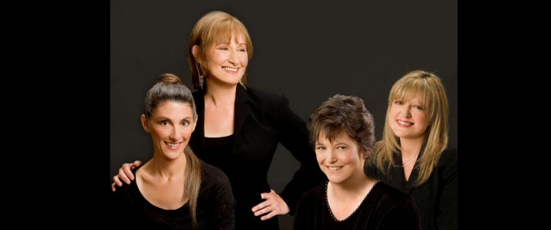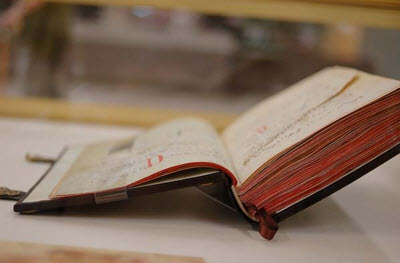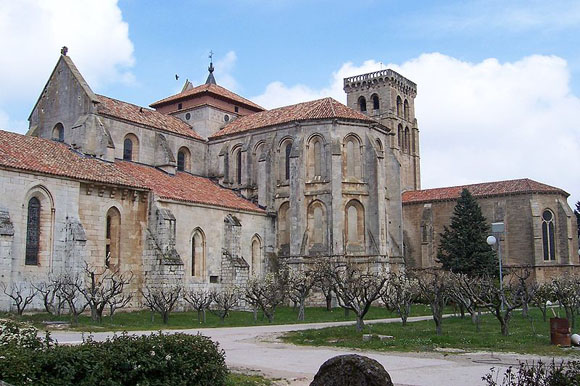Early music vocalists Anonymous 4, bearing gifts from new CD, to offer Chicago concert
 Profile: Susan Hellauer, seen second from left with Anonymous 4, shares insights about the group’s new recording, “Secret Voices.” The singers will perform Dec. 18 at the Art Institute of Chicago.
Profile: Susan Hellauer, seen second from left with Anonymous 4, shares insights about the group’s new recording, “Secret Voices.” The singers will perform Dec. 18 at the Art Institute of Chicago.
By Nancy Malitz
The astonishing vocal quartet that calls itself Anonymous 4 is celebrating its 25th anniversary season in two ways:
- With an anthology concert tour, including a Christmas-themed Chicago stop at the Art Institute, that draws from the group’s many recorded hits over the years.
 With a new CD release, “Secret Voices,” that the quartet has envisioned ever since its founding in 1986 — music from the Codex Las Huelgas, a rare Spanish manuscript from around 1300 that was rediscovered in 1904.
With a new CD release, “Secret Voices,” that the quartet has envisioned ever since its founding in 1986 — music from the Codex Las Huelgas, a rare Spanish manuscript from around 1300 that was rediscovered in 1904.
The Codex is a practical compendium of music from throughout the 1200s and a vivid document of the rich musical repertoire in daily use at a convent near Burgos in north-central Spain.
 The convent was located along the famous medieval pilgrimage route from France to Santiago de Compostela, where it was believed the remains of the apostle Saint James were buried. (Click at left to enlarge — or find an even larger version here. )
The convent was located along the famous medieval pilgrimage route from France to Santiago de Compostela, where it was believed the remains of the apostle Saint James were buried. (Click at left to enlarge — or find an even larger version here. )
Anonymous 4’s selections from this extraordinary musical collection were chosen to follow the cycle of a day’s devotions — from first light, through morning, Mass, evening and night. It’s a lovely invitation to imagine cloistered life in the convent, which was founded in 1180 by King Alfonso VIII of Castile as a refuge for aristocratic women seeking a religious life. The convent was therefore wealthy and royally privileged, and its nuns enjoyed a high degree of artistic freedom and religious responsibility. Or perhaps the nuns appropriated these freedoms for themselves.
 (The history of convent life in Spain and France suggests a pattern of some nunneries being left to their own devices for prolonged periods, peppered with occasional crackdowns. Read more about this in Hunter College professor Jo Ann Kay McNamara’s fascinating book “Sisters in Arms: Catholic Nuns through Two Millennia.”)
(The history of convent life in Spain and France suggests a pattern of some nunneries being left to their own devices for prolonged periods, peppered with occasional crackdowns. Read more about this in Hunter College professor Jo Ann Kay McNamara’s fascinating book “Sisters in Arms: Catholic Nuns through Two Millennia.”)
So, the nuns probably sang the music in the Codex Las Huelgas with gusto — it is beautiful and often exuberantly virtuosic — despite the ban on singing polyphony for nuns generally. This is the conviction of Anonymous 4, and the recording sports several lovely examples of lyrics that support their view.
But the whole feminine issue caused Anonymous 4, an all-female ensemble, to avoid the Codex when they were first starting out in the ’80s. “We didn’t want to get typecast. The air was different back then,” says Susan Hellauer, who typically sings the quartet’s lowest vocal lines and serves as the group’s researcher and Latin translator.
In fact the music of the Middle Ages lies very well for these women, who achieve a remarkable blend of pure serenity and spiritual passion. But after 25 years and 19 recordings, many of them award-winning, the issue of type-casting is no longer a concern.
 It was the recent publication of a sophisticated high-tech facsimile that drew Hellauer back to the project. She went to the Columbia University library to study the new reproduction and was transfixed. “The paper looks like the original in density and texture,” she says. “The book was not big. One tends to assume such an important thing would be bigger, but you can hold it in your hand and it’s very utilitarian looking, not at all filled with illuminations except for a few pretty letters.”
It was the recent publication of a sophisticated high-tech facsimile that drew Hellauer back to the project. She went to the Columbia University library to study the new reproduction and was transfixed. “The paper looks like the original in density and texture,” she says. “The book was not big. One tends to assume such an important thing would be bigger, but you can hold it in your hand and it’s very utilitarian looking, not at all filled with illuminations except for a few pretty letters.”
That the pages are very high-resolution fascimiles in full color is hugely important: “With the old black-and-white facsimiles we mostly worked with, it was hard to tell what was a fly speck and what was a notational mark,” Hellauer says. “When you see these practically real pages, almost like 3D, with the gradations of pressure of the pen, bleed-throughs from the other page, and some indications of parchment or vellum that had been scraped clean of previous contents to use again, it’s just a completely different experience.”
Scholars in the past have transcribed and published their own interpretations of what they saw on the pages. “But none were satisying to me in terms of the rhythmic interpretations,” says Heller. “They weren’t singable really, and we knew when we finally got to singing and living with the music as it was on the pages, trying to understand it from the inside, we would come up with our own ideas. The notation of rhythm was in such flux during that century — how to notate long, short, sort of short, short but not that short, long but not that long. Pretty much all the notational breakthroughs happened, in a series of important leaps forward, during the century represented by the Codex.”
Hellauer consulted closely with the British musicologist and manuscript expert Nicholas Bell, who wrote a companion volume for the Codex facsimile. He shared her belief that the rhythmic notations she found were to be taken with a grain of salt, especially if the scribe was copying down a 75-year-old piece. “You have to take each piece in its own little time period — might be 1225, 1250, 1270. So interpreting it is a combination of historical knowledge and musical intuition,” she says. “We try to strip the information down to the original, with no marks, no nothing. Even when we supply our texts for the programs, we leave spellings and capitalizations original. Our attitude is, ‘This is what it looked like. This is what you get.’ ”
Other musicians have recorded excerpts from the Codex. In “Secret Voices,” Anonymous 4 now adds its own versions. The CD also includes first recordings of a Gloria, a Benedicamus, a motet and a charming song of admonition to virgins. As for ultimate authencity in performance, Hellauer says it’s impossible to claim: “We can never deny using our modern sensibilities. We can’t completely wash Bach and the Beatles out.”
The highlights are many on this absorbing disc, but here are few particular delights that offer a glimpse of convent life as interpreted by Anonymous 4:
- Discant: “Fa fa mi / Ut re mi” (track 4): A charming round begins as an exercise reciting the pitch names, then adds text that says it’s “foolish to despise these because they are the elements of music.” And also, “Sing out … you cloistered virgins .. you were born to cultivate polyphony.” Click here for track excerpts.
- “O monilias conscio” (track 15): A soaring two-voice lament sung to the assembled nuns of Burgos, offering comfort and assurance upon the death of a beloved sister, “this innocent one; … applaud her victory for she shines in glory.”
- Motet: “Claustrum pudicicie” (track 3): The lilting grace of this motet, originally a secular ode to love, is paired in the Codex with a text in praise of virginity. It is utterly convincing as something that would have been sung by female voices.
- Song: “Si vocatus ad nupcias” (track 20): Recorded for the first time, this simple melody is all innocence, sung in unison, offering advice to young virgins to prepare for their spiritual bridegroom.
“Women can sing all this music,” concludes Hellauer, leaving open the question of whether all the nuns at the abbey, including the most highborn, actually did. She mused that even orphans might have participated as part of their lower religious training.
“There was likely strict social stratification between foundlings and the women from high families. But musical talent would have prized no matter who had it. In fact, music was one of the great democratizers in the middle ages, a way to get three squares and a nice life.”
Related links:
- Anonymous 4 will give two concerts at the Art Institute of Chicago on Dec. 18: Order tickets online at museumtix.
- Anonymous 4 is on tour: Check tour dates in other cities.
- Audio samples from “Secret Voices”: Go to the artists’ website and click on the player inset at right.
- Complete Anonymous 4 discography: Visit the artists’ page at Harmonia Mundi
- More on the pilgrimage route: Browse the rich UCLA site maintained by Prof. John Dagenais, Dept. of Spanish and Portuguese.
- More on the Las Huelgas Codex facsimile: Go to the University of Miami Library, Frank Cooper Music Facsimile Collection.
Photo captions and credits: Home page and top: Anonymous 4 members are, left to right, Marsha Genensky, Susan Hellauer, Ruth Cunningham and Jacqueline Horner-Kwiatek (artists’ website). Upper left: The pilgrimage route (John Dagenais, UCLA). Middle left: Images of the new facsimile of the Codex Las Huelgas include a page with dainty stitched repairs, and the reproduced book with its tooled leather binding. (University of Miami library, Frank Cooper Music Facsimile Collection). Below: Abbey of Santa María la Real de Las Huelgas near Burgos.
Tags: Abbey of Santa María la Real de Las Huelgas, Anonymous 4, Las Huelgas Codex, medieval music, Nicholas Bell, Santiago de Compostela, Secret Voices, singing nuns, Susan Hellauer



No Comment »
2 Pingbacks »
[…] link: Early music vocalists Anonymous 4, bearing … – Chicago On the Aisle This entry was posted in Uncategorized. Bookmark the permalink. ← Caption Contest: Name […]
[…] link: Early music vocalists Anonymous 4, bearing … – Chicago On the Aisle This entry was posted in Uncategorized. Bookmark the permalink. ← Caption Contest: Name […]